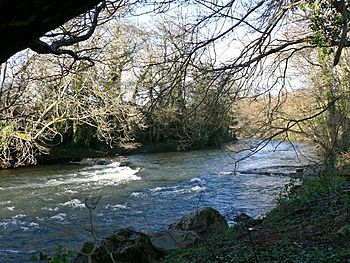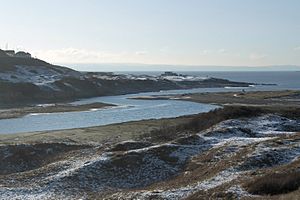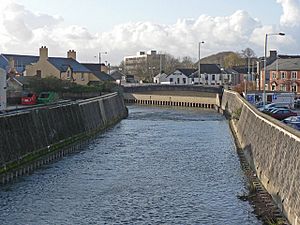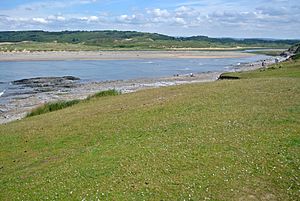River Ogmore facts for kids
Quick facts for kids Afon ogwr |
|
|---|---|

The Ogmore River at Pen-y-cae, north of Bridgend.
|
|
| Native name | Ogmore river |
| Country | Wales |
| Cities | Blackmill, Brynmenyn, Aberkenfig, Bridgend, Ogmore-by-Sea |
| Physical characteristics | |
| Main source | Craig Ogwr |
| River mouth | Bristol Channel near Ogmore-by-Sea 51°28′11″N 3°38′18″W / 51.46972°N 3.63833°W |
| Basin features | |
| Tributaries |
|
The River Ogmore (called Afon Ogwr in Welsh) is a cool river in South Wales. It's a favorite spot for people who love to fish! This river flows mostly from north to south. It starts in the Ogmore Valley and Gilfach Goch. Then it passes towns like Bridgend and Ogmore-by-Sea.
The River Ogmore begins high up at Craig Ogwr, a hill 527 meters tall. It starts as the Ogwr Fawr. Later, it joins with another stream called the Ogwr Fach near Blackmill. Other rivers like the River Llynfi, the River Garw, and the River Ewenny also flow into the Ogmore. Finally, the Ogmore flows into the sea, specifically the Bristol Channel. This happens between Ogmore-by-Sea and the cool sand dunes of Merthyr Mawr.
Contents
Where the River Ogmore Flows
The Ogmore River has two main parts where it starts. These are called its "headwaters." One part is the Ogwr Fawr. This stream flows south through places like Nantymoel, Ogmore Vale, and Lewistown.
The other part is the Ogwr Fach. This stream joins from the east and flows through Gilfach Goch. After another small stream called the Nant Iechyd joins, the Ogwr Fawr and Ogwr Fach come together. They then form the main Afon Ogwr (River Ogmore) at Blackmill.
Most of the river's starting points flow over old coal layers. These layers are covered by glacial drift (stuff left by glaciers) and fluvial gravel (rocks carried by rivers). The valleys where the river flows are quite wide for a small river. In the past, many of the smaller streams used to wind and curve a lot.
But during the 1800s, many towns grew along the river. This meant most parts of the river were made straighter and narrower. In some places, like Bridgend, concrete walls were built to stop floods.
Major Rivers Joining the Ogmore
The River Ogmore has a few important rivers that flow into it. These are called its tributaries.
The River Llynfi
The River Llynfi (called Afon Llynfi in Welsh) is about 10 miles long. It starts north of Maesteg. This river flows mostly south through the Llynfi Valley. It joins the River Ogmore at Aberkenfig.
The River Garw
The River Garw flows generally from north to south. It runs through a town called Pontycymer. This river meets the Ogmore (Ogwr) at Brynmenyn.
The River Ewenny

The Ewenny River (called Afon Ewenni in Welsh) starts northeast of Bridgend town. It flows through Pencoed and Coychurch. Then it enters the Ogmore River's estuary (where the river meets the sea) just below Ogmore Castle.
River Environment and Health
For a long time, mining and heavy industries in the Ogmore Valley caused a lot of damage to the river's natural environment. But things have gotten much better in recent years! Now, the river has many healthy aquatic invertebrates. These are small creatures without backbones that live in water.
Even with improvements, the river still faces some challenges. It's close to big industrial factories. Also, some building projects aren't careful enough with the river. And there are invasive weeds that can harm the river's ecosystem.
Where the River Meets the Sea
A few years ago, a sewage treatment plant near the river used to release dirty water into the estuary. But now, the water from the plant is cleaned using special ultraviolet light. This treated water doesn't flow into the river very often. However, if there's a lot of rain, emergency pipes might release some sewage into the river.
Fish in the River Ogmore
When the area was busy with industries, there were almost no salmon or trout in most of the Ogmore River. But brown trout did manage to survive in many of the smaller streams that fed into it.
Since the 1980s, things have changed a lot! Salmon and sea-trout have started coming back to the main river and the River Garw. Their numbers are growing more and more. The River Llynfi was very polluted, so fish avoided it for a long time. But even there, native brown trout numbers have gone up in the upper parts of the river. Sometimes, stocked rainbow trout are also found.
Now, you can find trout in almost all parts of the river. Salmon and sea trout are also found nearly everywhere. Other fish like eels are still common. You can also find Millers Thumb, Gudgeon, Stone loach, and Minnow throughout the river.
 | Bayard Rustin |
 | Jeannette Carter |
 | Jeremiah A. Brown |



